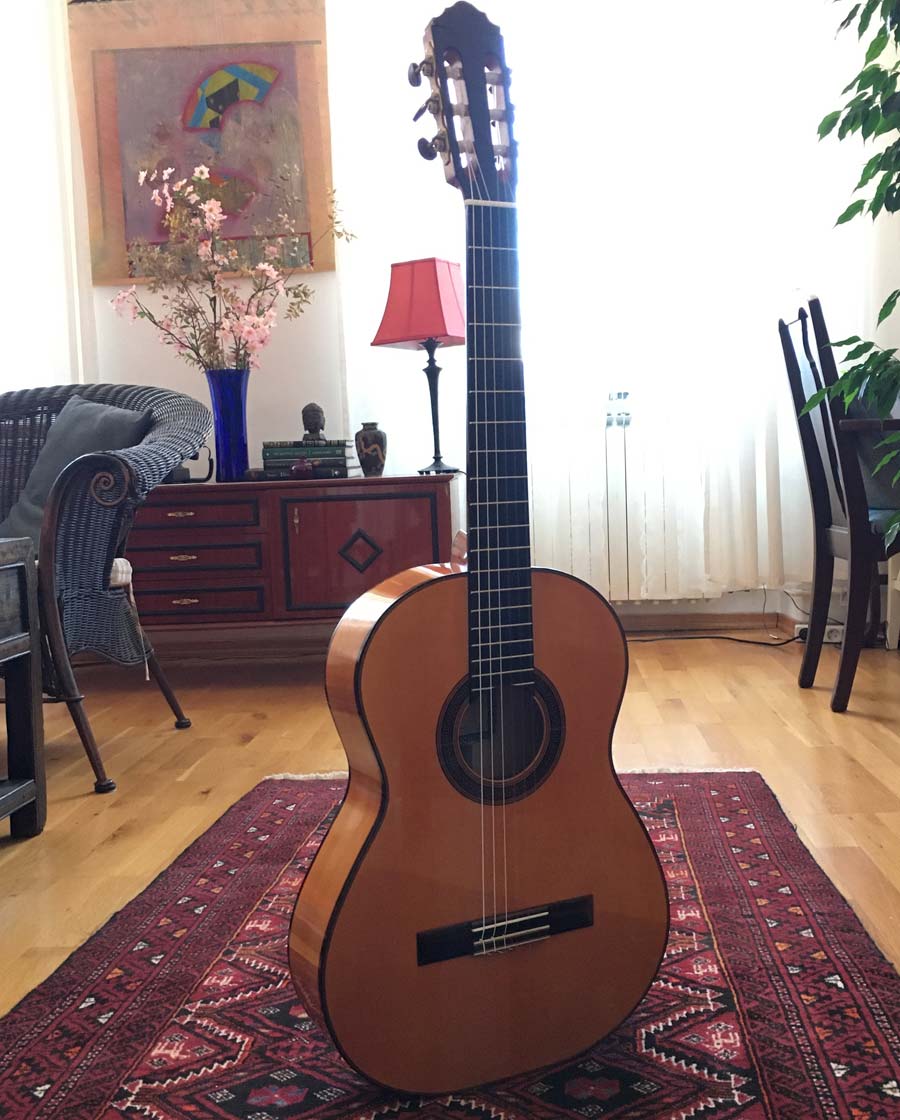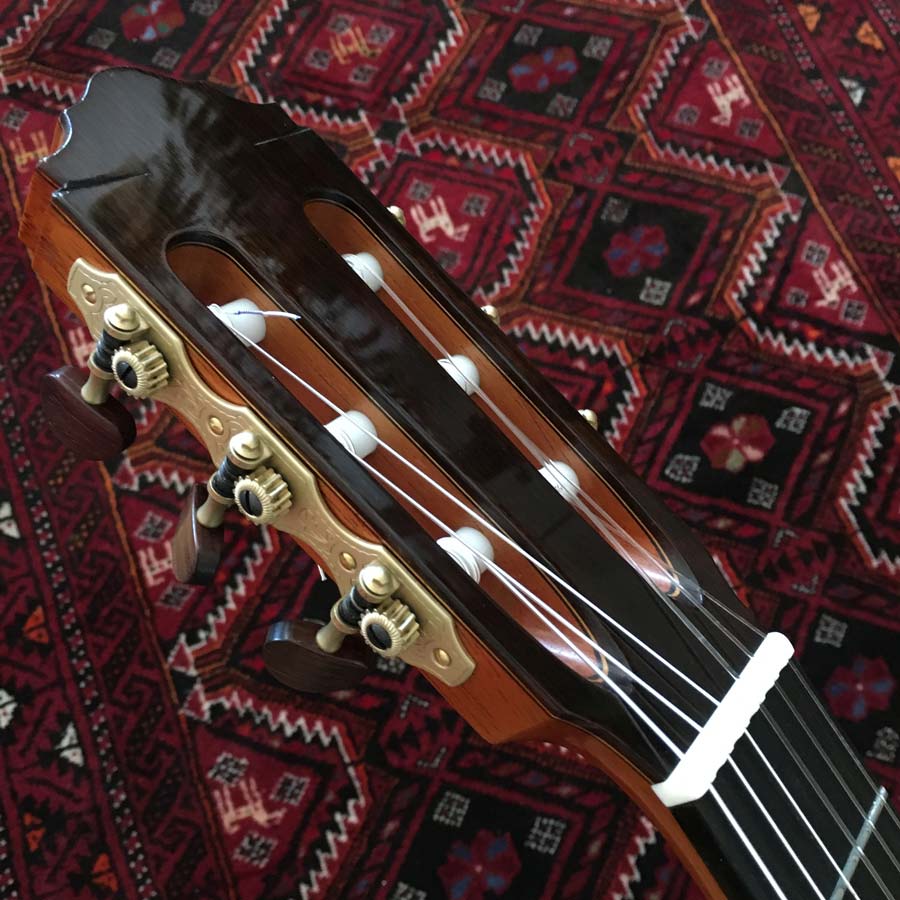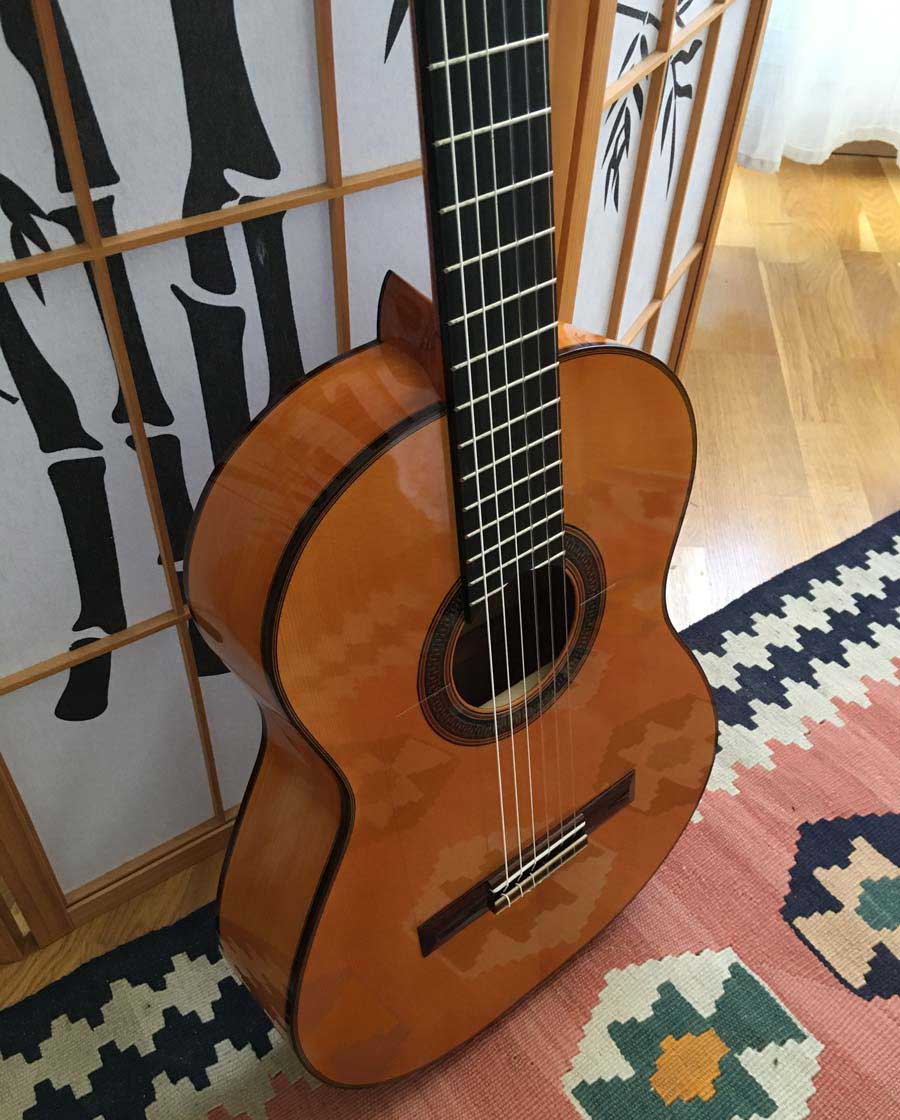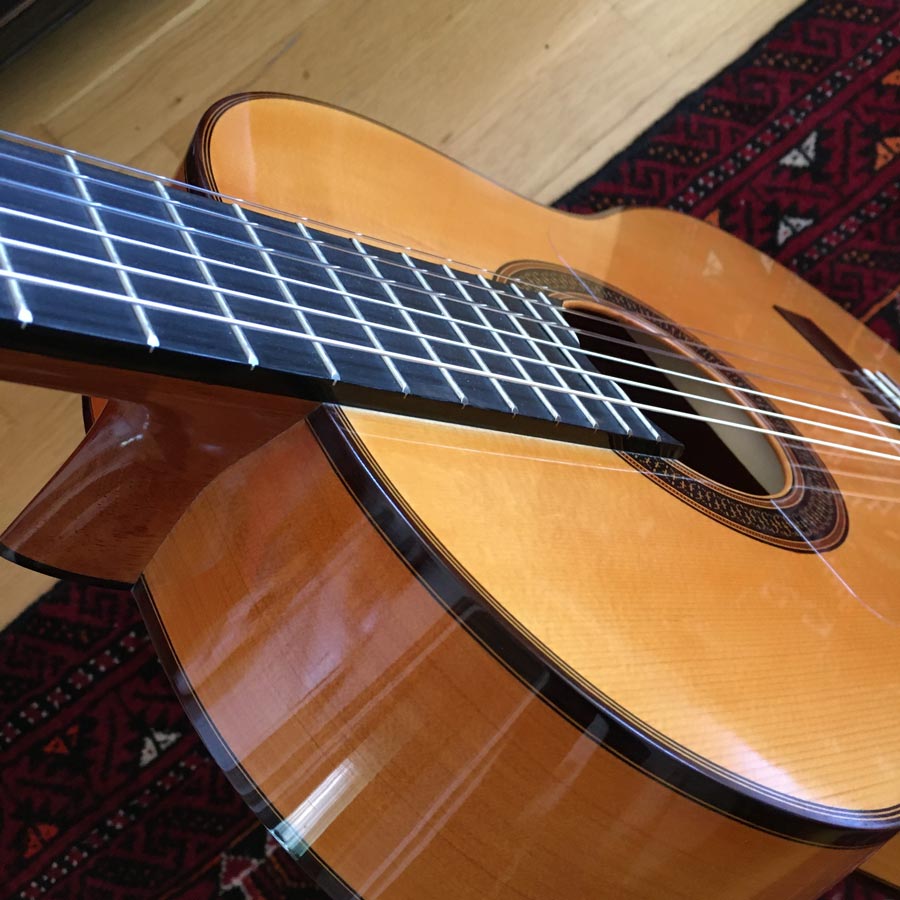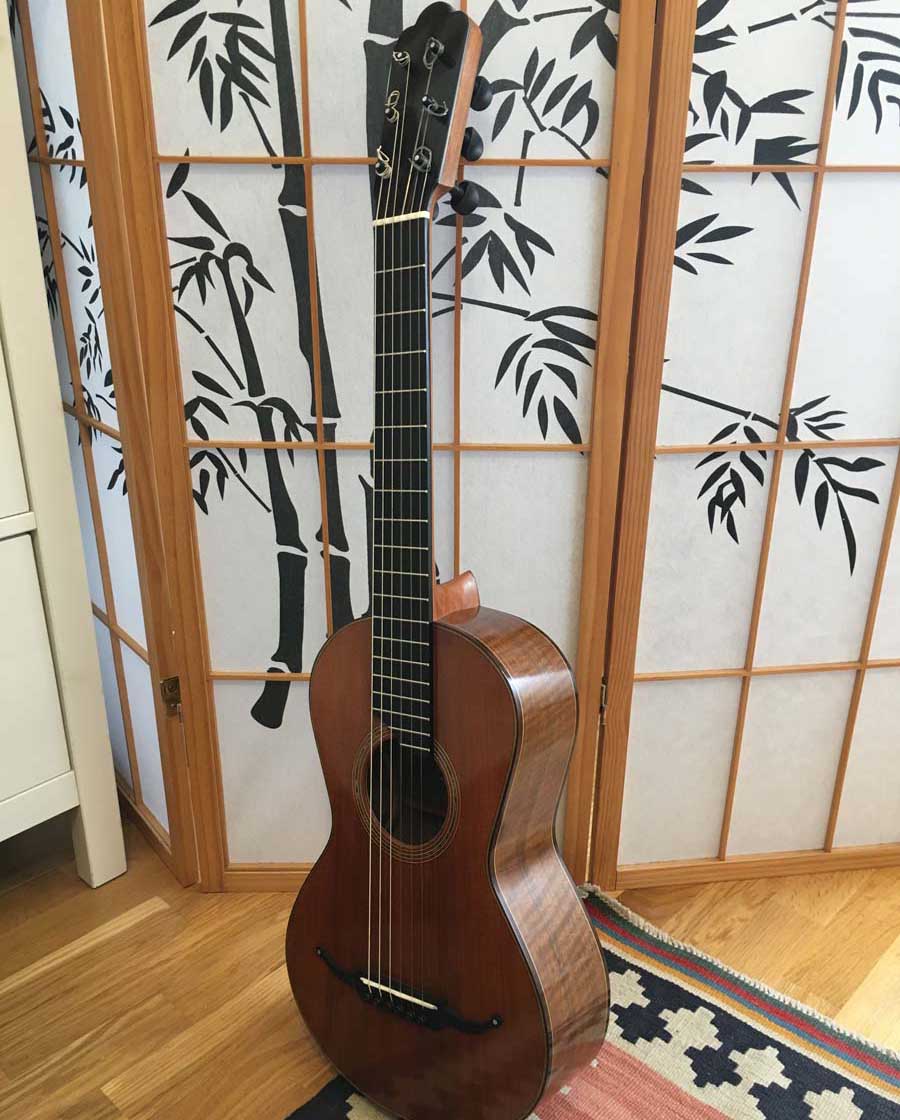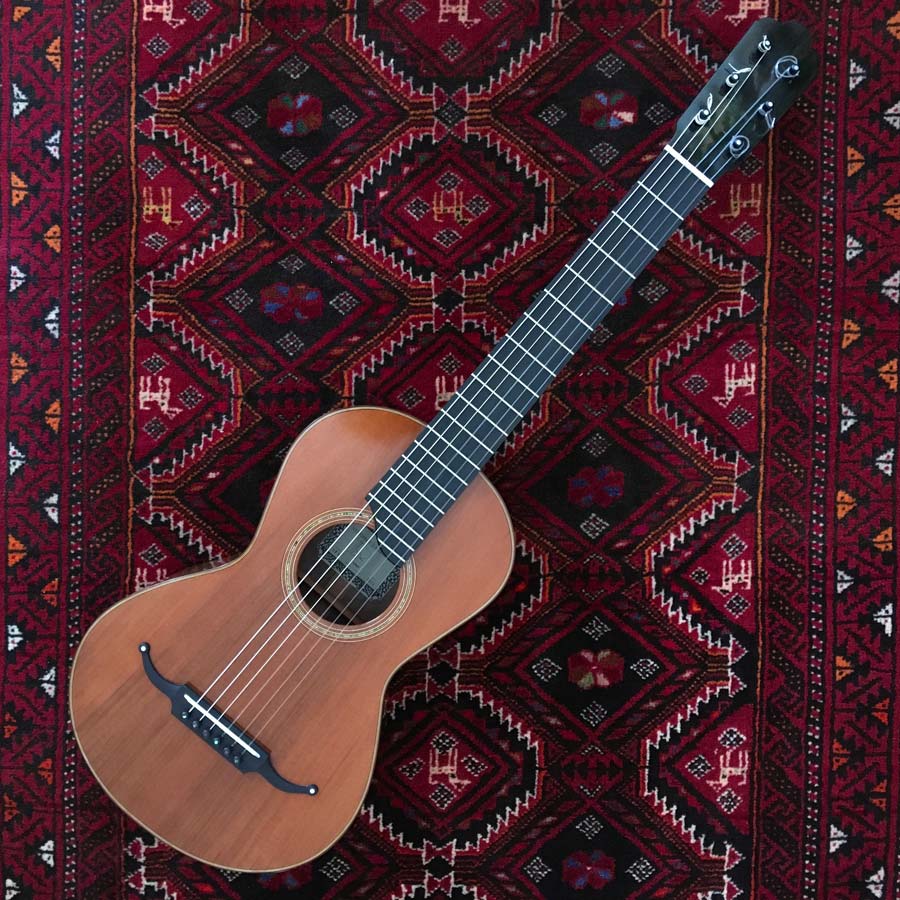Showcase
From the Shop.
Random photos of guitars, ukuleles, workshop, details and progress.
Flamenca blanca
Flamenca blanca. Bright and resonant. Clear bases, strong volume and big dynamic range characteristic for flamenco guitars. Light construction and pleasure to play. Top European spruce; back and sides Spanish cypress; neck Spanish cedar; Ebony fingerboard. Tuners by Rubner. French polished.
Flamenca blanca
Flamenca blanca. Bright and resonant. Clear bases, strong volume and big dynamic range characteristic for flamenco guitars. Light construction and pleasure to play. Top European spruce; back and sides Spanish cypress; neck Spanish cedar; Ebony fingerboard. Tuners by Rubner. French polished.
Flamenca blanca
Flamenca blanca. Bright and resonant. Clear bases, strong volume and big dynamic range characteristic for flamenco guitars. Light construction and pleasure to play. Top European spruce; back and sides Spanish cypress; neck Spanish cedar; Ebony fingerboard. Tuners by Rubner. French polished.
Flamenca blanca
Flamenca blanca. Bright and resonant. Clear bases, strong volume and big dynamic range characteristic for flamenco guitars. Light construction and pleasure to play. Top European spruce; back and sides Spanish cypress; neck Spanish cedar; Ebony fingerboard. Tuners by Rubner. French polished.
Early Romantic guitar
Early Romantic guitar in the French style, inspired by Lacôte. Features a Sinker Redwood top and American Walnut back and sides, with traditional ebony tuning pegs. French polished. The slightly deeper body than what is typically found on instruments from that era produces a distinctive tone with strong volume. Very responsive and a pleasure to play. Call for price.
Early Romantic guitar
Early Romantic guitar in the French style, inspired by Lacôte. Features a Sinker Redwood top and American Walnut back and sides, with traditional ebony tuning pegs. French polished. The slightly deeper body than what is typically found on instruments from that era produces a distinctive tone with strong volume. Very responsive and a pleasure to play. Call for price.
Western Red Cedar top with East Indian Rosewood back and sides
Western Red Cedar top with East Indian Rosewood back and sides. Ebony fretboard on Spanish Cedar neck with carbon fiber rod reinforcement. French polished. Strong and responsive, yet very balanced tone. Call for price.
Western Red Cedar top with East Indian Rosewood back and sides
Western Red Cedar top with East Indian Rosewood back and sides. Ebony fretboard on Spanish Cedar neck with carbon fiber rod reinforcement. French polished. Strong and responsive, yet very balanced tone. Call for price.
Western Red Cedar top with East Indian Rosewood back and sides
Western Red Cedar top with East Indian Rosewood back and sides. Ebony fretboard on Spanish Cedar neck with carbon fiber rod reinforcement. French polished. Strong and responsive, yet very balanced tone. Call for price.
Western Red Cedar top with East Indian Rosewood back and sides
Western Red Cedar top with East Indian Rosewood back and sides. Ebony fretboard on Spanish Cedar neck with carbon fiber rod reinforcement. French polished. Strong and responsive, yet very balanced tone. Call for price.
Flamenca blanca
Flamenca blanca. Bright and resonant. Clear bases, strong volume and big dynamic range characteristic for flamenco guitars. Light construction and pleasure to play. Top European spruce; back and sides Spanish cypress; neck Spanish cedar; Ebony fingerboard. Traditional ebony tuning pegs. French polished. Audio samples: Sample#1; Sample#2
Flamenca blanca
Flamenca blanca. Bright and resonant. Clear bases, strong volume and big dynamic range characteristic for flamenco guitars. Light construction and pleasure to play. Top European spruce; back and sides Spanish cypress; neck Spanish cedar; Ebony fingerboard. Traditional ebony tuning pegs. French polished. Audio samples: Sample#1; Sample#2
Flamenca blanca
Flamenca blanca. Bright and resonant. Clear bases, strong volume and big dynamic range characteristic for flamenco guitars. Light construction and pleasure to play. Top European spruce; back and sides Spanish cypress; neck Spanish cedar; Ebony fingerboard. Traditional ebony tuning pegs. French polished. Audio samples: Sample#1; Sample#2
RMC pickups installation on cello bridge
RMC pickups installation on cello bridge to be played through MIDI.
French polishing
French polishing is a traditional finishing method using shellac, a resin secreted by a female lac bug that lives in Asia. The resin is scraped from the branches of a tree, processed, and commonly sold as flakes. To prepare the finish shellac is dissolved in alcohol then rubbed on the surface by a pad in very small amounts using a few drops of oil as a lubricant. The process consists of laying down hundreds of super thin layers that cross-link and build up a protective layer of finish.
Assembled
Ready for binding and gluing the fretboard.
Inside
Inside the body, ready for closing.
Bracing
7-fan bracing based on Torres/Houser.
Rosette
Aside from being a signature detail of a maker the rosette is a decorative and structural element. The pattern shown here is made from over seven thousand wood "pixels".
Design and Ergonomy
The solera is the workboard on which the guitar is made. It sets the neck angle and the height of the bridge. The mold shown here allows for a different shape and body sizes.
Rosette
Aside from being a signature detail of a maker the rosette is a decorative and structural element. The pattern shown here is made from over seven thousand wood "pixels".
Design and Ergonomy
Sculpting the head.
Next: Fretting
All the gluing had been completed and the guitar is ready for fretting and the final shaping of the neck.
Compass Plane
Part of the guitar making process and enjoyment is making your own tools. Shown here is the "compass" plane with arched bottom that was used in making a solera and the concave base for gluing arched braces that results in doming of the plates. Wood used: Cherry, East Indian Rosewood (bottom). The blade is from an old Stanley plane.
Tunning Machines
Beautifuly crafted high-quality Sloane tuners come as a standard. Details
Shop
Just a random image of the shop and the workbench.
Mosaic Rosette
Aside from being a signature detail of a maker the rosette is a decorative and structural element. The pattern shown here is made from three kinds of an exotic wood and the black veneer.
Mosaic Rosette
Aside from being a signature detail of a maker the rosette is a decorative and structural element. The pattern shown here is made from three kinds of an exotic wood and the black veneer.
Ukulele Tenor
Ukulele comes in four main different sizes: soprano, concert, tenor and baritone. Shown here is tenor. Wood used for the one shown: East Indidan Rosewood for sides and back; Western Red Cedar for the top; Mahogany neck.
Temporary Mold
Used to keep the sides in shape after bending.
Back Jointing Before Joining
Preparing the back plates for gluing.
Closing the Body
Back glued to the sides, end block and the neck block.
Ukulele Tenor
Top: Red Western Cedar (Thuja plicata); Sides and back: East Indian Rosewood (Dalbergia latifolia)
Ukulele Tenor
Top: Red Western Cedar (Thuja plicata); Sides and back: East Indian Rosewood (Dalbergia latifolia)
Ukulele Tenor
Top: Red Western Cedar (Thuja plicata); Sides and back: East Indian Rosewood (Dalbergia latifolia)
Ukulele Tenor
Top: Red Western Cedar (Thuja plicata); Sides and back: East Indian Rosewood (Dalbergia latifolia)
Ukulele Tenor
Top: Red Western Cedar (Thuja plicata); Sides and back: East Indian Rosewood (Dalbergia latifolia)
Repairs
Side crack and broken neck Taylor 214; loose bridge Taylor 714ce
